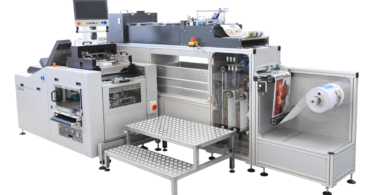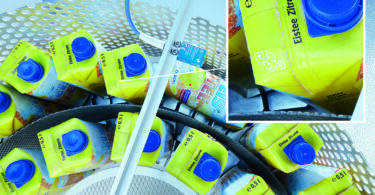How SICK technology is helping to pave the way for a bright and sustainable future
The machine builders at Klebo Technics B.V. in the Netherlands are known for their extensive expertise in machines and components for ultrasonic welding. But that's not all.
“Our customers often contact us about an ultrasonic application, but then quickly realize that we offer a lot more in the areas of machine, module, and system building,” said Managing Director Johan Klein Leetink. Most surprisingly is their work in producing solar panels with the aid of SICK vision.

Even with just twenty employees, Klebo undertakes all areas from design and manufacturing to service and maintenance. Its machines are supplied to companies in numerous industries all over Europe, including large companies in the grocery and pharmaceutical industry.
The key to Klebo’s success: customized high-tech solutions
There are many reasons for the company’s success, according to the managing director.
“Traditionally we have been known for our responsiveness and the good service we provide. And we continue to meet these expectations as our machines develop more and more in the direction of high-tech solutions. We are also making big development steps in the area of service. We now also analyze machine malfunctions remotely. Our customers’ machines stand idle for no longer than necessary,” Klein Leetink said.
Project Manager Dick Rozendal gave another important reason for why customers enjoy collaborating with Klebo.
“We don’t deliver serial products, but rather customized solutions. We prefer to get involved as early as the initial planning steps. For some projects, very specific processing methods or component configurations are desired, which, based on our experience, are very difficult to implement from a mechanical engineering perspective,” Rozendal said. “By involving us at an early stage, we are still able to suggest changes to the customer. More easily implemented options can often be found. Because we are given a say in projects, our customers receive a machine that offers them added value.”

How the panels are made
In the factory hall, Klein Leetink and Rozendal proudly point out one of their successful machines.
“We are building here a module that will be used in a production line for novel solar panels. The innovative aspect of these panels is that the solar cells are mounted on a fiber-reinforced plastic plate. Holes need to be drilled in this plate into which insertion sleeves for the cabling are then inserted,” Klein Leetink said.
“Initially, the customer wanted to saw the holes using an ultrasonic tool. That's why he got in touch with us. During the discussion it was quickly apparent that the ultrasonic technology would be much too slow for this application. In the end, we jointly selected this drilling solution. The machine drills the six required holes in just 30 seconds and inserts the sleeves,” Rozendal said.

SICK robot guidance is essential for production
The PLOC2D robot guidance system plays an important role in inserting the sleeves. Six white sleeves with grooves are placed on the conveyor via a tension spring. The PLOC2D vision system scans the sleeves and identifies their orientations by means of the grooves. This information is sufficient for the robot to get started: it grips all six sleeves, rotates them into the desired position, and inserts them.

Klein Leetink explained SICK technology was an easy decision when deciding on a system.
“We like to work with regular suppliers. If the collaboration works and agreements are met, that's the best option. We also receive constructive advice from SICK when needed,” Klein Leetink said.
His project manager, Rozendal, agrees: “In the case of this application, we sent a photo of the sleeve to SICK. They then suggested several solutions right away. When we have more complex queries, someone will often simply drop by and visit us.”
What else does Klebo build?
Klebo Technics has been well known in the food industry for some time now.
“Our best known machines include so-called absorbent pad placers,” Klein Leetink said. “Everybody knows the typical meat packaging on the supermarket shelves. Integrated into this packaging is a kind of fleece that absorbs the meat juices. We bond the absorbent pad to the packaging using ultrasonic welding,” he explains.
In 2025, absorbent pads will be banned under EU law. Why? Absorbent pads that have been cut sometimes leave behind fibers in the meat product. Together with a patent holder who has developed a special packaging, Klebo Technics will soon offer a new sustainable solution for the meat industry.

“This new packaging – with the brand name Beemagic – comprises a mono material and is therefore 100 percent recyclable. Truly unique, however, is the perforated film at the bottom. This creates a double bottom for the packaging. All meat juices that seep through this film remain trapped in the bottom area — even when the packaging is turned over,” Rozendal said. “The big advantage is that the meat does not lie in its own juices, but can be reached by the gas in the packaging. This enables the shelf life to be extended by three to five days. Together with a large retailer, we have already calculated that the company needs to throw away seven million euros less of meat per year, thanks to this improvement.”
Where can you find the new Beemagic packaging?
Despite the fact that the industry still sees the higher price of the new packaging as a drawback, Klein Leetink expects the new packaging to soon be in very high demand.
“More regulations await the industry, and it will not just be about the absorbent pads. For example, it will be necessary to further improve the recyclability of packaging. With our machines, we have now developed the technology to integrate the perforated layer into the packaging,” Klein Leetink said. “One caviar producer is absolutely delighted with the new concept. He is already using our new technology and the new Beemagic packaging.”
Want to learn more about SICK's vision and robot guidance solutions? Contact us today!




